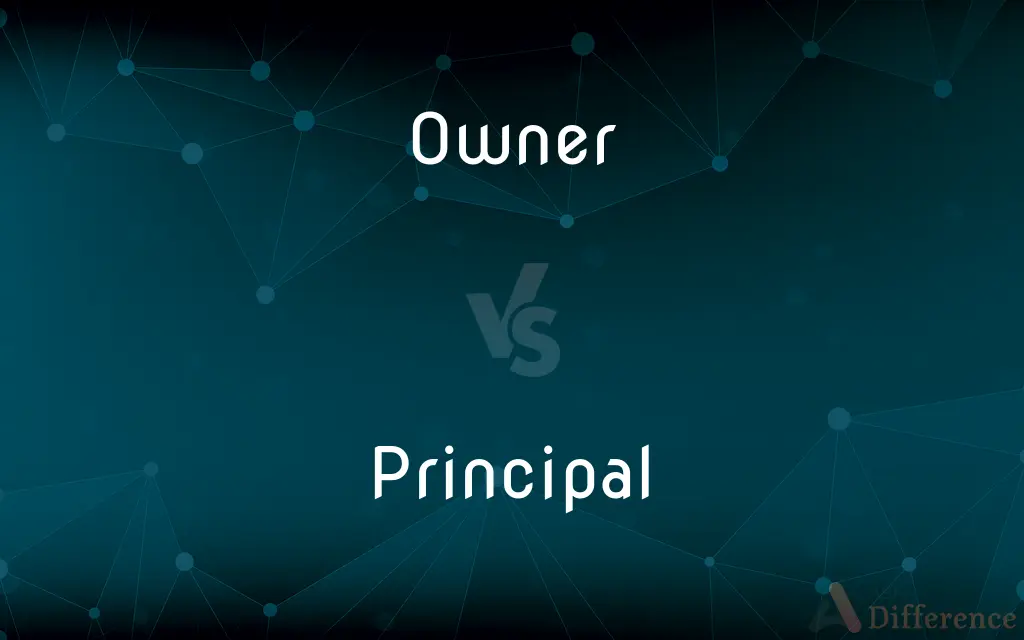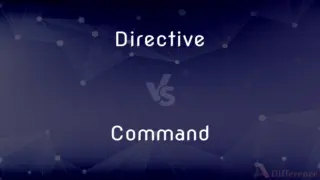Owner vs. Principal — What's the Difference?
By Tayyaba Rehman & Urooj Arif — Updated on June 8, 2024
Owner refers to someone who possesses property or assets, focusing on legal rights. Principal means the main party to a transaction or the head of an institution.

Difference Between Owner and Principal
Table of Contents
ADVERTISEMENT
Key Differences
An owner is someone who has legal title to something, such as property, businesses, or assets. This possession entails rights such as sale, use, and benefit from the property. Whereas the term principal can have several meanings depending on the context; in a business setting, it refers to the main party involved in a transaction, often bearing the most significant risk.
In the context of educational institutions, a principal is the head or leader, responsible for managing the operations of a school, including administrative duties and policy enforcement. On the other hand, an owner of a business is involved in the overarching control and decision-making but may not handle daily operations, especially in larger organizations.
Owners have the ultimate authority over their assets and can make decisions regarding their use, management, or disposal. They hold the equity and bear the consequences of their assets' performance. In contrast, principals in transactions act as the primary entities engaging in contracts or agreements, potentially impacting their financial or legal standing based on the transaction's outcome.
Regarding legal implications, ownership confers a wide array of rights protected by law, including the right to transfer ownership through sale or inheritance. Principals, particularly in legal or financial contexts, have specific obligations and rights within the scope of their transactions, often governed by contractual agreements.
In educational or organizational contexts, principals must adhere to policies and guidelines set by governing bodies or owners. While they exercise considerable authority within their domain, their actions are typically subject to oversight by owners or boards, highlighting a distinction in autonomy and scope of authority.
ADVERTISEMENT
Comparison Chart
Definition
Legally recognized possessor of property or assets
Main party in a transaction or head of an institution
Context
Broad, applicable in various settings (property, business)
Business transactions, education, or legal contexts
Key Responsibilities
Decisions on use, management, disposal
Managing operations (in institutions) or being the main party in transactions
Legal Rights
Ownership rights, transferability
Rights and obligations as per contractual agreements
Impact of Role
Direct impact on asset performance and use
Impacts organizational operations or transaction outcomes
Compare with Definitions
Owner
A person who legally possesses an asset or property.
The owner of the bookstore decided to renovate the interior.
Principal
The chief participant in an operation or activity.
The project’s principal investigator led the research.
Owner
Someone holding equity in a company.
As an owner, she was deeply invested in the company's growth.
Principal
The head of an educational institution.
The principal announced a new policy for student conduct.
Owner
The holder of a title.
The car's owner must provide proof of insurance.
Principal
In finance, the original sum of money invested or loaned.
The loan’s principal must be repaid before interest.
Owner
An individual with proprietary rights.
The software owner controls its distribution.
Principal
The main entity in a business transaction.
The principal in the deal demanded stricter terms.
Owner
A party having ultimate control over an asset.
The painting’s owner loaned it to the museum for an exhibit.
Principal
A primary party to a legal agreement.
As the principal, he was responsible for the contract's fulfillment.
Owner
A person who owns something
Restaurant owners
The proud owner of a huge Dalmatian
Principal
First in order of importance; main
The country's principal cities
Owner
Of or belonging to oneself or itself
She makes her own clothes.
Principal
Denoting an original sum invested or lent
The principal amount of your investment
Owner
To have or possess as property
Owns a chain of restaurants.
Principal
The most important or senior person in an organization or group
A design consultancy whose principal is based in San Francisco
Owner
To have control over
For a time, enemy planes owned the skies.
Principal
A sum of money lent or invested, on which interest is paid
The winners are paid from the interest without even touching the principal
Owner
To admit as being in accordance with fact, truth, or a claim; acknowledge
"I own that I have been sly, thievish, mean, a prevaricator, greedy, derelict, / and I own that I remain so yet" (Walt Whitman).
Principal
A person for whom another acts as an agent or representative
Stockbrokers in Tokyo act as agents rather than as principals
Owner
One who owns something.
The police recovered the stolen car and returned it to its owner.
Principal
A thing of chief or prime importance; something fundamental or especially conspicuous.
Owner
One who owns; a rightful proprietor; one who has the legal or rightful title, whether he is the possessor or not.
Principal
Capital as contrasted with the income derived from it
Owner
A person who owns something;
They are searching for the owner of the car
Who is the owner of that friendly smile?
Principal
The major party to a financial transaction at a stock exchange; buys and sells for his own account
Common Curiosities
Who can be considered an owner?
Anyone who legally possesses property, assets, or equity in a business.
What does a principal do in a school?
Oversees administrative tasks, implements policies, and manages staff and students.
What legal protections do owners have?
They have rights to use, manage, sell, or transfer their property as protected by law.
Is the role of a principal limited to educational settings?
No, it can also refer to main parties in transactions or legal agreements.
Can an owner also be a principal in a transaction?
Yes, an owner can act as the principal in transactions involving their assets.
How do principals in business transactions differ from owners?
Principals are primarily involved in the transaction itself, bearing its risks and rewards, while owners have broader rights and responsibilities regarding their assets.
What are the key differences in the legal rights of owners vs. principals?
Owners have broader legal rights regarding their property, while principals have rights and obligations defined by specific transactions.
How does ownership transfer work?
Through legal processes such as sale, inheritance, or gifts, respecting local laws.
Can a principal be a company or must it be an individual?
A principal can be either a company or an individual, depending on the context.
Can a principal in a transaction also have ownership rights?
Yes, if the transaction involves their owned assets, they may have both roles.
What responsibilities do principals have in schools?
They are responsible for everything from policy implementation to day-to-day operations.
How does ownership impact business decisions?
Owners have the ultimate authority over business decisions, including strategic direction and use of assets.
What distinguishes a principal’s responsibilities in transactions from those of an owner?
Principals are focused on the specific obligations and rights within the transaction, whereas owners have broader control and rights over their assets.
What is the importance of principals in educational institutions?
They ensure the institution operates effectively, adhering to educational standards and policies.
How do ownership rights affect asset management?
They allow the owner to decide how the asset is used, managed, or disposed of.
Share Your Discovery

Previous Comparison
Pulmonary vs. Respiratory
Next Comparison
Directive vs. CommandAuthor Spotlight
Written by
Tayyaba RehmanTayyaba Rehman is a distinguished writer, currently serving as a primary contributor to askdifference.com. As a researcher in semantics and etymology, Tayyaba's passion for the complexity of languages and their distinctions has found a perfect home on the platform. Tayyaba delves into the intricacies of language, distinguishing between commonly confused words and phrases, thereby providing clarity for readers worldwide.
Co-written by
Urooj ArifUrooj is a skilled content writer at Ask Difference, known for her exceptional ability to simplify complex topics into engaging and informative content. With a passion for research and a flair for clear, concise writing, she consistently delivers articles that resonate with our diverse audience.













































